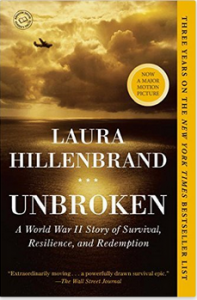 I first became aware of Louis Zamperini’s story through the movie Unbroken, released last Christmas. After seeing the movie, I wanted to read Laura Hillenbrand’s book on which the movie is based: Unbroken: A World War II Story of Survival, Resilience, and Redemption. The book did not disappoint – it is even better than the movie! Zamperini’s troubled growing up years, his experience as a runner at the 1936 Olympics, details of his WWII combat missions, his 47 days stranded on a raft in a remote part of the Pacific ocean, his capture and torture by the Japanese, his post war life, and more are all described in rich detail by Hillenbrand.
I first became aware of Louis Zamperini’s story through the movie Unbroken, released last Christmas. After seeing the movie, I wanted to read Laura Hillenbrand’s book on which the movie is based: Unbroken: A World War II Story of Survival, Resilience, and Redemption. The book did not disappoint – it is even better than the movie! Zamperini’s troubled growing up years, his experience as a runner at the 1936 Olympics, details of his WWII combat missions, his 47 days stranded on a raft in a remote part of the Pacific ocean, his capture and torture by the Japanese, his post war life, and more are all described in rich detail by Hillenbrand.
Unbroken is one of the best researched books I have ever read. I liked how the author backs up her story with revealing facts about World War II life. “World War II, 35,933 AAF (Army Air Force) planes were lost in combat and accidents,” she writes in one section, giving us a picture of how dangerous Zamperini’s missions were. “Of the 34,648 Americans held by Japan, 12,935—more than 37 percent—died,” she writes in another chapter, revealing how brutal the Japanese WWII prisoner of war camps must have been. “By comparison, only 1 percent of Americans held by the Nazis and Italians died.”
More than statistics, Hillenbrand as a skilled wordsmith describes incidents in Zamperini’s life as though we were there with him. In the movie Zamperini’s Olympic experience is only touched on briefly. In the book Hillenbrand tells us what it was like for Zamperini to be a visiting American athlete in 1936 Nazi Germany. “Louie was led into the führer’s section,” she writes. “Hitler bent from his box, smiled, and offered his hand. Louie, standing below, had to reach far up. Their fingers barely touched. Hitler said something in German. An interpreter translated. ‘Ah, you’re the boy with the fast finish.'” The author does a wonderful job of condensing her many hours of interviews with Zamperini to the printed page.
What I liked best about Unbroken was the telling of Zamperini’s post war struggle with bitterness, his conversion to Christianity, and the power of forgiveness in his life. “What made his life transcendent, what made it resonate in millions of hearts, was not the hardship he encountered, but the way in which he greeted it, how he turned it to joy, and what that told the rest of us about the potential that sleeps within ourselves,” Hillenbrand wrote in her eulogy to Zamperini. Zamperini passed away in July 2014, but his story lives on to inspire us all.



